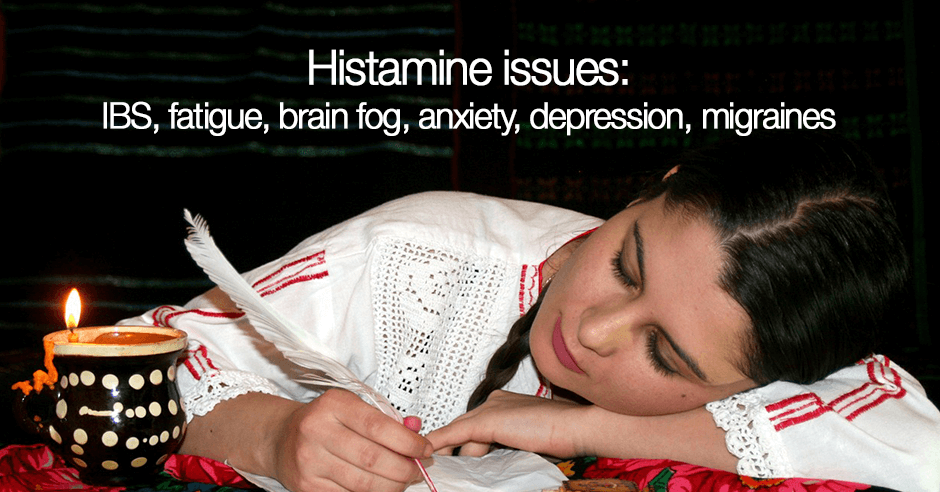
Dr. Ben Lynch is hosting the Dirty Genes Summit Jan 22-39 and he shares this about you and your genes:
You are not a victim of circumstance… born with bad genes, destined to die of whatever your family tree has genetically bequeathed you.
The way your genes express is unique – and it can change throughout your life.
Knowing how to create that change is vitally important and you’ll see how clear this is in his wonderful histamine interview with Yasmina Ykelenstam of Healing Histamine.
I love the bucket analogy where Yasmina shares about histamine and inflammation:
Imagine the body as a giant bucket and there is only so much inflammation you can put into it before our inflammation causing behaviors that you can fill it up with before you spill over symptoms. So let’s say you fill it with a few high histamine foods; then you feel it up with stress; then you fill it up to being exposed to animal hair (dander); then pollen season starts; and woah, we’re right, right, right at the top; and then we eat an apple which is not high histamine, it doesn’t cause inflammation, in fact, it’s anti-inflammatory; and suddenly we spill over because the active digestion itself is an inflammatory process.
We blame the poor little apple and not the hamburger we ate the week ago that started the inflammation bucket filling up. We don’t blame the puppy because we love the doggy so much. We certainly don’t blame our stress because we don’t want to take too hard a look at our lives and how difficult it would be for us to make changes, steps to take real steps to handle our stress and to start meditating or to remove stressful processes from our life because that’s just too much for us to handle
She shares how you can combat some of this by adding foods with
anti-properties: anti-histamine and anti-inflammatory properties…I just stopped eating the wrong high histamine foods, the processed ones, the sugary ones, the ones that added nothing to my life beyond the two seconds in my mouth.
Dr. Lynch asks Yasmina to list symptoms she experienced in this midst of her histamine issues (many of which are commonly seen in individuals with histamine issues)
IBS, which is mostly loose stools or being totally bound up so you can’t go to the bathroom for 8 days and they tend to go back and forth… severe swelling of the stomach – what I call basketball stomach… At my worse, it was projectile vomiting and constant nausea, and constant until it went away… chronic migraines. I once had migraines every day for six months before they went away. Common symptoms include dizziness, brain fog, low blood pressure, feeling dizzy when you stand up… really, inability to think straight is a really, really big one. It’s kind of like somebody almost puts a wet blanket over your brain. It tends to happen after you eat.
She also shares how fatigue after eating is often an issue. And how intolerance to alcohol is a factor, specifically red wine:
Most people do better with tequila, vodka, rum and gin, although alcohol paralyzes the thiamine oxidase, histamine degrading enzyme.
There is also a mental health impact from histamine issues – histamine is a neurotransmitter – and Yasmina shares how this may impact you:
…it affects dopamine, GABA, serotonin, and it can make us depressed. It can also make us manic as I discovered in my teens. It can mimic the symptoms of bipolar disorder and also schizophrenia. There’s been a few interesting studies where certain types of antihistamines that are not available on the market were able to reverse schizophrenia symptoms better than antipsychotic medications.
Anxiety is also a very, very big histamine symptom and whenever I see somebody who has a histamine problem, they do tend to be quite stressed out and kind of the chicken or the egg, which came first. But definitely histamine causes more stress and anxiety and that again is in the medical research.
This statement about symptoms rotating was new to me and may be new to you too:
It has to be consistent and then it goes away and then it comes back again. That’s what’s really confusing about histamine because: 1. It mimics many disorders, and 2. The symptoms rotate
All in all, this is a fascinating interview and well worth listening to!
Join the summit and you will learn that your genes can be turned off or on and this event will teach:
- How Do Your Genes Impact You?
- How to Clean Your Genes With Food
- About Your Genes and Your Mental Health
- How to Alter Your Genetic Expression
- The Building Blocks of Healthy Families (and generations!)
- An Understanding of How Your Genes Work
- Genetic Testing and How to Clean Up Your Genes for the Long Term
Register for the Dirty Genes Summit here – to hear this entire interview and learn from Dr. Ben Lynch and the other experts he interviews.
Hope you can join!

Hi, I recently searched my 23andMe profile with the query “histamine” and it handed me “HNMT”, the histamine n-methyl transferase gene and the explanation that I wouldn’t process histamine normally and I would be sensitive to tartrazine, yellow dyes etc. I knew this about myself because any time I took yellow pills, I would get an itchy anus; but doctors and pharmacists thought I was crazy. And the most common antihistamine, benadryl(diphenhydramine) hangs around in my system for a long time because CYP2D6 in my liver is almost totally inactive and it’s the primary CYP to break down diphenhydramine for elimination. Everyone who can, should look at their CYP450 liver enzymes in their DNA profile. It can be a life and death matter, especially since the first line breast cancer treatment, tamoxifen, is only effective once it is processed into the active compound endoxifene by CYP2D6. Most opioids are also activated by this CYP which is why I get no pain relief from them.
Susan
Thanks for sharing! Yes HNMT polymorphisms may be related to increased histamine. This paper: “Increased histamine levels in patients with AD [Atopic Dermatitis] may result, at least in part, from reduced inactivation via HNMT.” https://www.ncbi.nlm.nih.gov/pmc/articles/PMC2642612/
And yes CYP450 / CYP2D6 polymorphisms may mean higher doses of opioids are needed in order to provide relief.
This paper has a nice explanation: “Patients with chronic pain who require high doses of opioids to achieve pain relief show exceptionally high rates of defects of the cytochrome P450 (CYP450) enzyme system compared with the general population.
The CYP450 enzyme system is known to play an important role in the metabolism of opioids, and recent advances in genetic testing allow for the easy detection of defects to the enzymes.
“We’ve known for years that among patients with the exact same pain conditions one may need 500 mg of morphine a day while the other may need only 50 mg, but we’ve always wondered why,” lead author Forest Tennant, MD, told Medscape Medical News.
“It turns out that among high-dose patients, about 85% have these defects in 1 or more of their CYP450 enzymes.” In the general population, only about 20% to 30% of people have CYP450 defects, he said.” More here https://www.medscape.com/viewarticle/771480
Please note the word MAY – we may have the polymorphism and be fine if it’s not expressing.
I’d love to know if Yasmina and folks in her community have these polymorphisms – giving them a higher propensity to histamine issues? It wasn’t mentioned in the interview.
Hi,
I was wondering if you have pyroluria and over methylation, does that effect histamine levels? If so, what can you do for that?
Mickey
It gets confusing as the histamine issues being discussed in this interview are not the same as low and high histamine (whole blood histamine) that Carl Pfeiffer wrote about and what William Walsh now teaches about. More on that here https://www.everywomanover29.com/blog/methylation-and-anxiety-histadelia-and-histapenia/
Trudy, do you hear chronic nausea and chronic anxiety is related to histamine ?
Hi Trudy, Histamine intolerance is my biggest problem and it is my most frustrating. I do have a homozygous DAO snp, but never had any issues until my 40’s…..this is when it reared it’s ugly head for the first time…at the time I didn’t know it was a histamine issue but my main problems are skin reactions (my chin and eyelids become red, swollen, blister and then peel). When it is behaving, all is good and I can be okay for months or years but then something will tip me over the edge (sometimes I know what it is, other times I can’t fathom it out) and I then have to cut back everything and use every type of intervention I can to get it under control again. So I continually work on trying to keep my DAO gene clean 🙂
Can kidney glandulars help with histamine intolerances?
Candy
I don’t have any experience with kidney glandulars so I’m afraid I can’t help
Hello Trudy, can you please share your experiences with tryptophan for someone healing from histamine intolerance? And what’s your thoughts about avoiding tryptophan if one has ME/CFS? Thank you greatly!
Malin
If someone has low serotonin symptoms I have them do a trial of tryptophan. I see no reason to avoid it if someone has histamine intolerance or ME/CFS unless they have an adverse reaction? Can you share if you have these issues and have an adverse reaction, how much you used and which product? And which low serotonin symptoms?